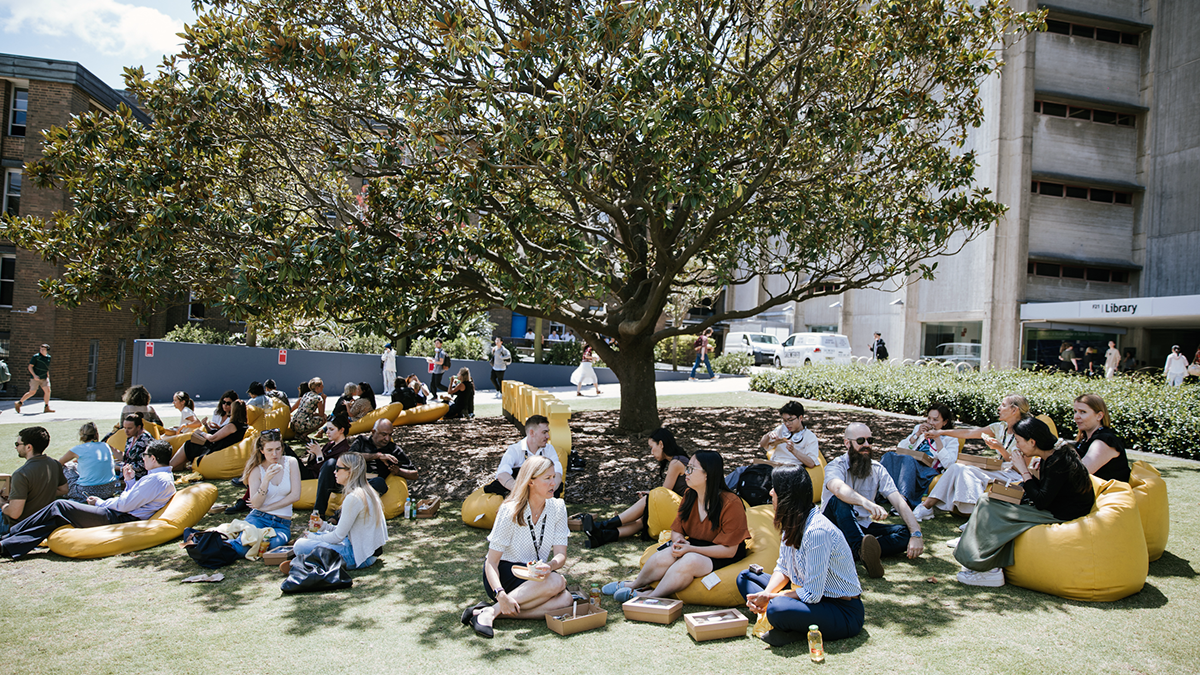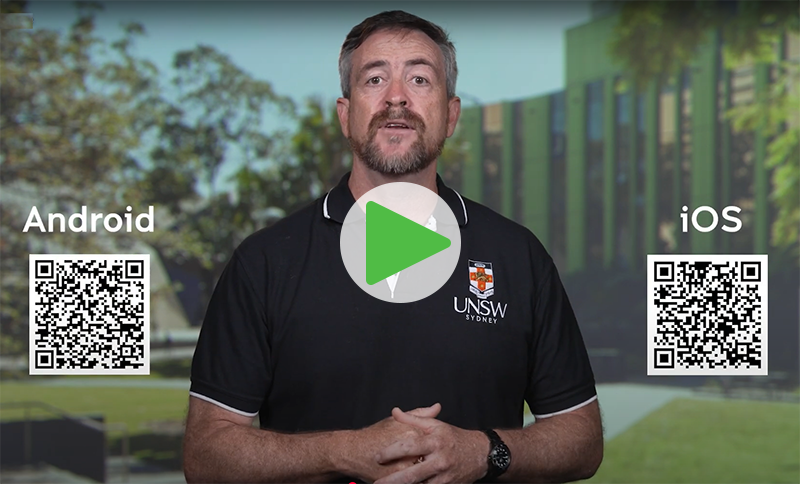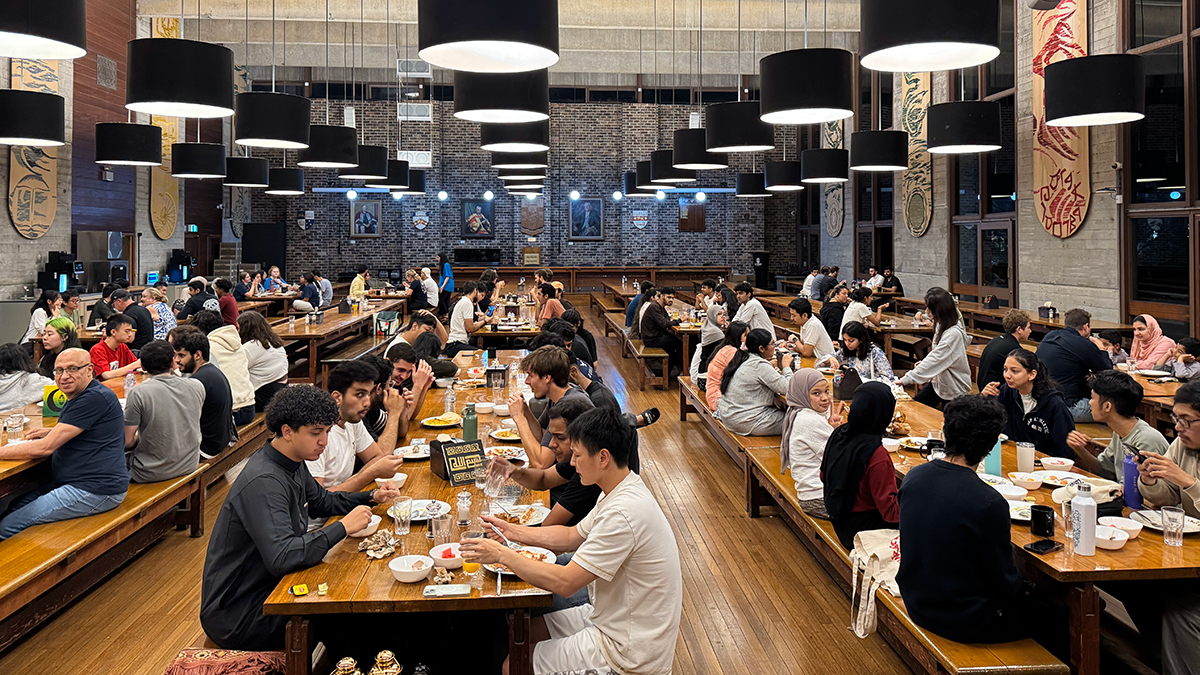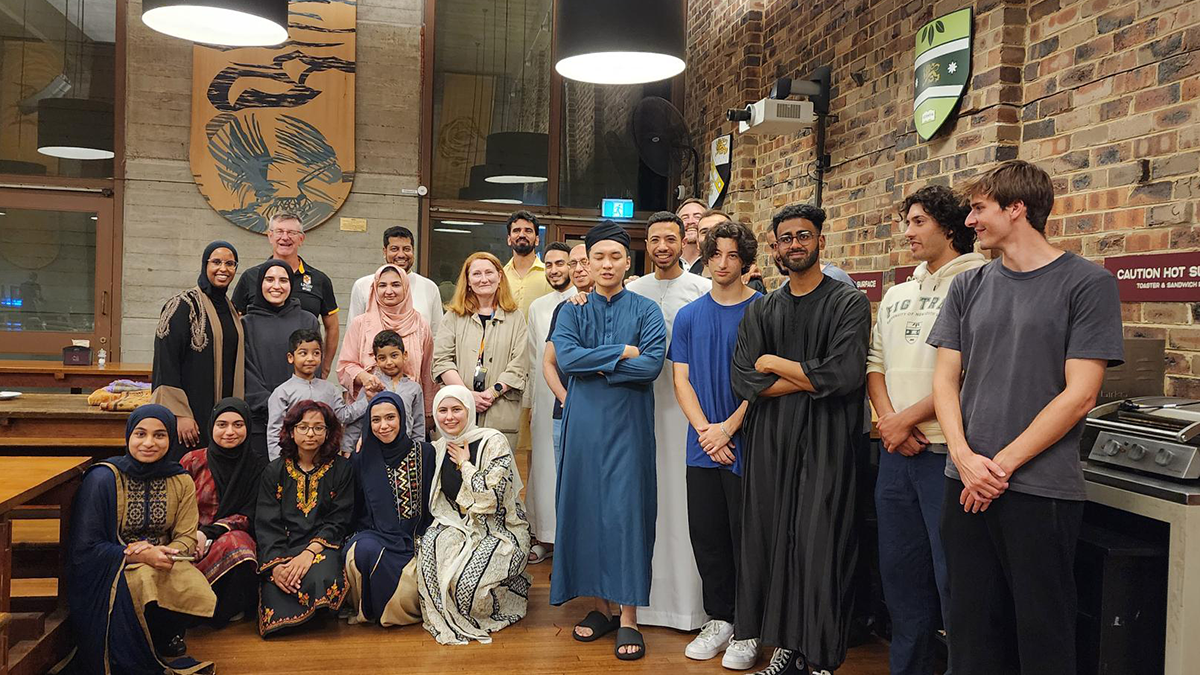
Dear colleagues
It was a great pleasure to attend the 10th anniversary of the Michael Crouch Innovation Centre (MCIC) last week. Over the past decade, the MCIC has evolved into a vibrant hub for creativity, collaboration and problem-solving. The Centre embodies the spirit of innovation and entrepreneurship that sets UNSW apart, makes our community distinctive and will be crucial in our mission of Progress for All. It gives students the tools, mentorship and resources to transform their ideas into tangible outcomes in an environment where innovation flourishes. Whenever I visit MCIC I’m impressed by the number of our students who are focusing on concrete and positive ways to address societal challenges and drive positive change, even before they graduate.
UNSW Strategy: Progress for All next steps
Last week’s launch of the new UNSW Strategy: Progress for All was outstanding (see photo of the launch top and below). Thank you to the organisers and to everyone who made the time to come. We’ve received very positive feedback from colleagues about the inspirational speakers who shared insights into the impactful work they are doing, and I couldn’t agree more. I was particularly excited to hear from Doha Goreishi, a fourth-year Chemical Engineering student and Gateway Ambassador. Doha’s experience illustrates the talent, high performance and potential found in students across the community. Her story is inspiring students who might not have considered university possible, showing them that excellence and success at university are achievable.
UNSW Strategy: Progress for All values ‘collective progress’. It’s an ambitious strategy – but not for our own sake. It’s ambitious for people and communities everywhere. The Strategy’s success will be measured by the success of those whom the strategy supports.
With the Strategy launched, it’s time to move to implementation and every person at UNSW has a role to play. I encourage you to read the Strategy which can be found on the new UNSW Strategy: Progress for All website. In the coming weeks, the website will be updated with a range of resources to help develop local action plans and approaches that will enable everyone to align their work with the Strategy’s mission.
The Strategy’s implementation will be guided by an Operational Plan, which will ensure we focus each year in a systematic and planned way. The Operational Plan does not attempt to capture in full the important activities of faculties and divisions, instead it sets out major University-wide focus areas for delivery that year. This approach allows us to achieve our goals in manageable steps, not trying to do too much (in our excitement!) but achieving incrementally over the next decade, to create huge and meaningful change. The 2025 Operational Plan will be available soon.

Above: Speakers at the UNSW Strategy: Progress for All launch. Pictured, left to right, are Aunty Maxine Ryan, Neda Dowling, Professor Heidi Norman, Associate Professor Rebecca Deans, Doha Goreishi and Martin Collings.
Kirby Institute’s remote testing program wins Shaping Australia Award
An infectious disease testing program developed by UNSW’s Kirby Institute won the Community Champion award at the 2024 Shaping Australia Awards, which honour university-led innovations in research, teaching and community service.
The First Nations Molecular Point-of-Care (POC) Testing Program has made testing for infectious diseases more accessible in remote communities and been instrumental in reducing the spread of sexually transmitted diseases. This highly accurate testing, which provides same-day results, has led to a reduction in pelvic inflammatory disease and in preterm births among young Aboriginal and Torres Strait Islander peoples.
I’m truly inspired by the dedication of the researchers who have developed this program. Tens of thousands of tests have been conducted since the program was launched more than a decade ago, leading to better treatment and health outcomes for people in remote communities suffering from infectious diseases. It’s undeniable that the POC Testing Program has changed thousands of lives for the better, and I’m very proud of our researchers who are helping to make this positive impact.
The award was announced at the Universities Australia (UA) summit in Canberra last week. I was pleased to attend the summit with colleagues from the higher education sector, looking at how universities can leverage their expertise to support societal challenges. The summit provided a valuable forum to explore the opportunities and challenges for the sector, especially during what has been, and is, an uncertain time for higher education.
Read more about the POC testing program on the UNSW Newsroom.
Transforming assessment and feedback
The first Heads of School Forum for 2025 was held last week, featuring an insightful presentation entitled ‘Assessment & Feedback Transformation: A Program-Level Approach to Assessment’, by DVC Education & Student Experience Professor Sarah Maddison and PVC Education Professor Christine (Tini) Mathies.
The presentation highlighted the opportunity for UNSW to reimagine our approach, moving from designing assessments just at the course level to program-level design that secures high quality assessment, feedback and academic integrity. The Assessment & Feedback Transformation program of work addresses current and emerging issues including generative AI, workplace readiness, external monitoring and regulation, over-assessment and the optimum assessment mix, as well as student and staff workload.
Sarah and Tini led an in-depth discussion with Heads of Schools about how the necessary transformation can take place at UNSW. I was impressed with the engagement and support that the DVCESE Division is already undertaking with students, schools, faculties and divisions. The focus is very much on bringing this transformation about in a way that provides the optimum assessment and feedback ecosystem for our future: one that secures UNSW graduates’ capabilities, ensures their own confidence in mastery, and continues to enhance the quality and integrity of our educational programs.
If you would like to find out more about the Assessment & Feedback Transformation program of work, or to get involved, please contact k.karras@unsw.edu.au and visit the Assessment and Feedback SharePoint site.
Help keep our campus safe
Ensuring our campus is a safe and welcoming place for all is everyone’s responsibility. There are simple steps you can take to help make our campus safe, including downloading the SafeZone app and familiarising yourself with campus emergency procedures.
The SafeZone app is the quickest way to alert our Protective Services team to any emergency on campus. Since we launched the app a year ago, I am pleased that more than 11,000 staff and students have registered. But there is room to improve. I encourage everyone to take the time to download the SafeZone app and to familiarise themselves with our campus emergency procedures.
Please watch this short video to learn more.

Vice-President Operations Andrew Walters retires
Andrew Walters, Vice-President of Operations, will be departing UNSW this month after a decade of dedicated service. I want to express my gratitude for Andrew's significant contributions in leading the Division of Operations, currently encompassing Finance, Human Resources, Estate Management and IT. Andrew was appointed Vice-President Operations in 2015 during the exciting and early stages of the Strategy 2025 development and leaves UNSW in a robust state for the implementation of the new UNSW Strategy: Progress for All over the next 10 years. I’m sure you will join me in wishing Andrew the best for his next chapter.
Ramadan pre-dawn breakfast a generous gathering
I was delighted to accept an invitation to attend the first pre-dawn meal of Ramadan, hosted by Fig Tree Hall in Goldstein College Dining Hall on behalf of the UNSW Colleges community.
This year’s breakfast was the largest yet. Hundreds of students and staff from across the University and UNSW Colleges, from a variety of backgrounds and faiths, joined those of Islamic faith as they began the holy month. Such a coming together of people from different backgrounds to express connection and fellowship with Muslim friends and peers was a wonderful illustration of the camaraderie of the UNSW community. I think you can just see me up the back of the second photo below and I loved being a part of this friendly, celebratory gathering on Saturday morning (yes, even though it was 4:15am).
Thank you to Rasheed Khan, Dean of Fig Tree Hall, for this most generous invitation. I wish all our Islamic students and staff Ramadan Mubarak.


Above: UNSW Colleges students and staff share pre-dawn breakfast on the first day of Ramadan in the Goldstein College Dining Hall.
UNSW gender pay gap trending downwards
Data released today by Australia’s Workplace Gender Equality Agency (WGEA) shows the gender pay gap (GPG) at UNSW for the 2023–2024 reporting period is 2.5%, based on median total remuneration. The GPG is the difference between the earnings of men and women, expressed as a percentage of male earnings.
Our GPG for 2023–2024 shows a downward trend from 3.1% for 2022–2023. (I do note that UNSW originally reported a 1.4% GPG for 2022–2023, but improvements in our data reporting and calculations methodology mean that the comparative GPG for 2022–2023 was 3.1%.) This downward trajectory is pleasing and we’re certainly heading in the right direction, but there is more to do. We cannot be complacent! Through key initiatives including the inaugural UNSW Gender Equity Strategy, gender equal recruitment policies and processes, our Enterprise Agreements for Academic and Professional Staff, the Sage Athena Swan awards and the Women’s Wellbeing Academy, we endeavour to continue this downward trajectory.
UNSW’s commitment to creating inclusive, high performing and equitable workplaces and workplace culture is unwavering. I echo the words of our Chief People Officer, Gemma Martin, who said today that UNSW is dedicated to fostering a workplace where individuals of all genders and backgrounds are afforded equal opportunities to succeed.
Read more about UNSW’s GPG and the WGEA data in this edition of Inside UNSW.
UNSW’s pride celebrates Mardi Gras Festival
The iconic Sydney Gay and Lesbian Mardi Gras Festival culminated over the weekend with the annual march down Oxford Street, now in its 47th year. It was wonderful to see campus awash with rainbow colours as the UNSW community celebrated our LGBTQIA+ students, staff and allies during the two-week festival.
UNSW is proud to support our LGBTQIA+ community. We are dedicated to creating campus environments where diversity and inclusion are at the heart of our culture. It’s important to remember that Mardi Gras began as a protest, and while we celebrate the progress that has been made over 47 years, we must continuously demonstrate our commitment to diversity and inclusion. This year’s festival theme, Free to Be, is a tremendous reminder and declaration of pride.
Thank you to our colleagues at Arc and Equity, Diversity & Inclusion for hosting a great range of activities and events during the festival, including the Pride Cup and a Mardi Gras [Viewing] Party at UNSW Art & Design. If you’d like to find out more about how UNSW is creating a safe and welcoming place for LGBTIQA+ people, or to get involved, please visit LGBTQIA+ Allyship@UNSW.
There’s more to read Inside UNSW…
- Ahead of International Women’s Day on Saturday, 8 March 2025, don’t miss the photography exhibition on Kensington Campus celebrating some incredible UNSW women and this Thursday’s special event featuring Australia’s first female commercial pilot Deborah Lawrie. I also encourage you to explore the Celebrating UNSW Women Trail which has 11 women added, recognising the diverse and remarkable achievements of these UNSW trailblazers.
- This week’s staff profile is Dr Helen Granziera, a lecturer in educational psychology in the School of Education who combines travelling and marathon running in 'runcations'.
- Three members of the UNSW community have been recognised as 2025 Fulbright Scholars. Congratulations to Dr Brooke Pereira, Dr Christian Said and Tia Valentini who have been recognised for their work in pancreatic cancer, cardiology and genetics.
Best regards
Attila
Professor Attila Brungs
Vice-Chancellor and President
- Log in to post comments
